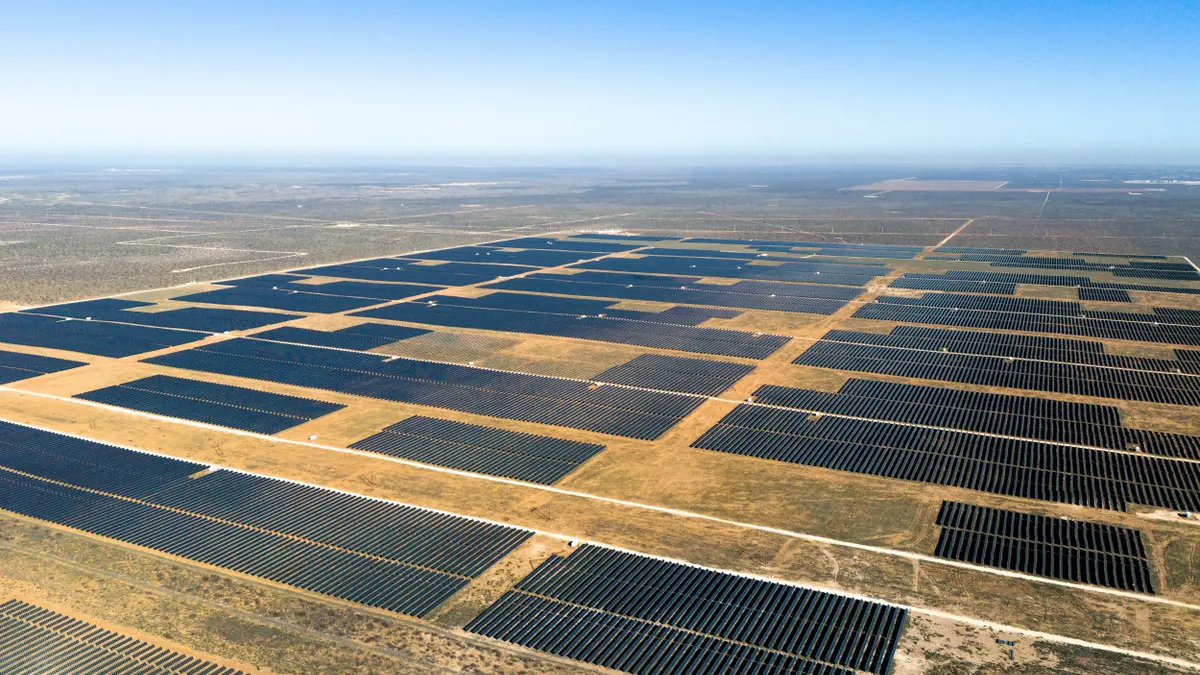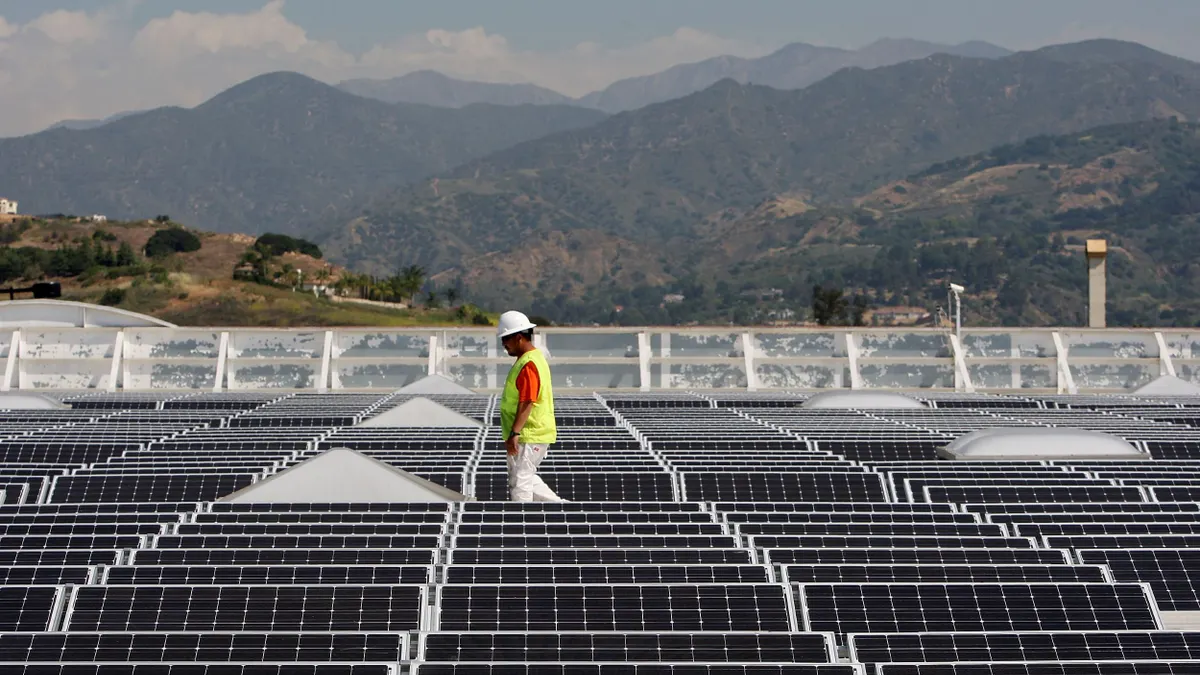This is the latest installment in Utility Dive's "Taking Charge" series, where we engage with power sector leaders on the energy transition.
Mark Christie, a former Virginia state regulator, joined the Federal Energy Regulatory Commission at a critical moment for its relationship with states.
Last year, Maryland's head regulator described the "tension" between federal and state regulatory authorities as being at an "all time high." In particular, the expansion of the minimum offer price rule (MOPR) in eastern regional transmission organizations (RTOs) has some states considering whether to exit the capacity markets altogether.
Under a new chair, and with a full complement of commissioners for the first time in years, FERC may be on a path away from the MOPR. But those aren't the only issues of state authority before the commission, Christie argued in a March dissent on FERC's order removing states' ability to deny aggregated demand response offers under Order 2222.
"It is indeed ironic that at the same time we hear many, including some members of this Commission, demanding that FERC 'respect' state public policies in capacity markets instead of imposing MOPR-type rules (and I have agreed with trying to accommodate state policies in RTO markets), this order goes in the exact opposite direction," he said in his dissent. "So apparently 'respect' for state public policies only applies when states are doing what some want."
In a comprehensive interview, Christie, who joined the commission in January, detailed his philosophy behind the dissent, his continued concerns about the March order on 2222, transmission, the MOPR and more.
This interview has been edited for clarity and brevity.
UTILITY DIVE: A lot has kind of been said about your experience as a state commissioner and how it might lend itself to this role. How has that perspective shaped your job at FERC thus far?
COMMISSIONER MARK CHRISTIE: As a state regulator, one thing you absolutely come in contact with constantly is the impact on people's bills of utility costs.
You set retail rates, and retail rates are what shows up in millions of people's bills. So you're very sensitive to that, or you should be very sensitive to that. And so, that sensibility I certainly brought with me, because while FERC regulates wholesale rates, what FERC does definitely affects retail rates. I'm not saying others don't have [a sensitivity to rate impacts], I'm just saying as a state regulator I've done these retail rate cases and I know how important that is to consumers.
The second thing I learned as a state regulator is that you learn what you don't know. Through the process of interacting with state regulators from all the other 49 states through organizations like [the National Association of Regulatory Utility Commissioners], I learned that every other state had a set of regulators that knew a lot more about that state than I do. I knew about Virginia, but I didn't know more than they did about their own state.
And I brought that with me to FERC as well because the state regulators know much more about their own states than I did as a Virginia regulator and that I will as a FERC commissioner, which was really the point I was making in my Order 2222 dissent.
UD: One of the things that stuck out to me in that March Order 2222-A dissent was your statement that this order will allow utilities to put billions of dollars into their rate base, in compliance with federal regulations. Do you feel utilities take advantage of federal regulations and rate base things that aren't necessary?
CHRISTIE: I'm not imputing bad motives to anyone but the reality is there are going to be substantial costs to prepare the local grid for what 2222 calls for, which is behind-the-meter access to the RTO markets.
When the utility goes into their state regulator and seeks cost recovery for these local grid costs, one of the most effective arguments that utilities have — and, again, I'm not imputing bad motive, I'm just making a statement of fact — one of the most effective arguments that a utility has when it goes to its state regulator and says 'We had to spend X dollars to upgrade the local grid' is to say that these costs were necessary to comply with a federal order.
Compliance with federal regulation is very hard for state regulators to say 'No' to, because if it's necessary to comply with a federal regulation, the state regulator is in a very difficult position rejecting the cost recovery.
UD: That sounds like one example of what you mentioned earlier: Sometimes federal regulators might make decisions that impact rates in a way that they don't realize. Are there other instances that perhaps other commissioners might be less aware of — or that you're more sensitive to — where an action that FERC takes can impact rates in an indirect way?
CHRISTIE: Well that's the example I have uppermost in my mind, because that's the one that happened [most recently] but it's a classic example, [of how] as a federal regulator you need to be sensitive to your actions on consumers.
It is really about consumers. It's not about the impact on state regulators. State regulators have a job to do, but it's the consumers who end up bearing the cost because if the state regulators have to allow cost recovery for compliance with federal regulation, that ends up being paid by the consumer.
So that's really the ultimate person at risk here: The consumer who's going to end up paying those costs. And that gets back to my original point: We, as a federal regulator, we always have to be sensitive to 'How is what we're going to do going to affect what the consumer is going to pay in his or her retail bill?'
UD: In that 2222 dissent, you also said 'Apparently respect for state public policies only applies when states are doing what some want.' Do you think there's a double standard of some sort when it comes to ensuring that states have the flexibility they need?
CHRISTIE: I'm not singling out any individual — the dissent speaks for itself — but respect for state authority, to me, I start from that in all cases, even if I don't like what the state's doing. There are a lot of states where I don't necessarily agree with their policy, but I think that if I can, I'm going to be deferential to that state, even though I might not personally like what their policy is.
And the classic example is in the MOPR. At my first meeting, I said that I would like to see the issue teed up in a general proceeding where everybody interested in it, everybody concerned about it, will have a chance to have their voice heard.
And my view is, again, speaking generally and not with regard to a formal proceeding, that respect for the states — to me, I'm not casting any doubt on anybody else — is an across the board principle.
UD: Are there any other ways you think 2222 could raise costs?
CHRISTIE: The biggest single thing, I think, is in the local grid. But one thing about that order is there's a lot of cost implications.
For example, when you're a retail rate regulator, you have to look at how you allocate costs for the maintenance of the grid, and how you design your rate structure to be fair to all consumers so you're not shifting costs from one consumer to another.
One of the points I made in my remarks on 2222-A was that every [load serving entity (LSE)] has different challenges and different needs. These people are not against phasing in [distributed energy resources (DERs)], but there are a lot of costly issues, and how you balance all those competing interests is a little bit different in every LSE.
We should trust those people who are on the scene, managing their co-p, managing their municipal power authority, managing the regulation of the different state-regulated LSEs. They know what those different challenges are. … and a lot of those involve money. One thing in utility regulation I've learned in 17 years is that everything is connected to everything, and when you initiate a certain change in policy, there are cost implications and it affects all consumers.
You always have to be looking at how consumers are affected, and whether one initiative affects one set of consumers, or all consumers. Those are complicated issues and, believe me, there's a lot of implications of 2222-A that have to do with costs on consumers that are going to be played out over the next several years.
UD: FERC is in the middle of these technical conferences, in part trying to address some of the controversy around the MOPR expansion. Do you have any takeaways from the first technical conference? What do you hope comes out of those proceedings?
CHRISTIE: It's a formal proceeding, so I'm not going to comment specifically beyond what I said. I would just reiterate that in my opening comments at the technical conference, I said this comes down to two questions for me.
The first big question is whether the public policies at the individual states can be accommodated in these capacity markets, while at the same time maintaining the goals of delivering reliability and least cost power. Again, as someone who respects the states, I would like to see these policies accommodated. But I asked the commenters, please tell us how.
And the second question I asked was a broader one, and that is whether the reality of politics in a large, multi-state RTO makes it impossible for these administrative constructs to consistently deliver reliable power at the least cost — because that's the goal and that was the economic goal when they were established. So, is that still realistic, is that still possible?
UD: Commissioners Glick and Clements, and somewhat Chatterjee, have implied that if some resolution is not figured out among stakeholders, they would be interested in FERC taking matters into its own hands. Could you comment on whether that's something you'd be interested in?
CHRISTIE: That goes to what we want to see come out of here and that's getting too specific, I think, on a pending proceeding.
I would like to hear, again, an answer to my question to the [stakeholders who comment]: Please tell us how we can accommodate state policies in these capacity markets, and still deliver reliable power at the least cost.
The purpose of this technical conference, and I'm glad the Chairman set it up — I compliment him for setting it up — is to tell us how. And that's what I'm waiting to hear.
UD: I want to jump to this reliability proceeding that was opened recently: What role do you think FERC can or should play in ensuring reliability in the face of extreme weather, particularly following events in Texas and California?
CHRISTIE: Americans expect and Americans deserve a reliable power supply — and most Americans would define that as 24/7/365 power. That's the goal.
FERC's number one job is reliability. And that's what we need to be really focused on more than more than hardly any other priority. It's been a lot of focus on Texas, but California had a very, very damaging outage last summer. So reliability is extremely important and I'm glad that it has been teed up by the chairman.
UD: There has been a lot of talk about transmission reform. Do you believe that this is something that FERC could potentially tackle?
CHRISTIE: In the Eastern RTOs for the last several years, one of the fastest growing parts of the consumer's bill has been the transmission part of it. The Independent Market Monitor, Dr. [Joseph] Bowring, in his most recent state of the market report pointed out that for the first time in the history of PJM, transmission costs are now greater than generation costs.
I'm not saying those are unjustified. I'm just saying the fact is that the transmission costs have been a rapidly rising cost to consumers, certainly in the Eastern RTOs and I think you'd see [that] in the other RTOs as well. So as the regulator of RTOs, I think it certainly should be front and center in our attention about the cost to consumers of transmission.
I want to emphasize: I'm not saying that those costs are not justified. I'm not saying that this project should not have been built. I'm just saying as a fact that this is a rapidly increasing part of consumers' bills. So we need to be looking very closely at any proposals that any person, any group makes for increasing transmission costs even more than they've already been going up.
UD: [The Public Utility Regulatory Policies Act (PURPA)] is another issue the commission addressed last year that was controversial in some ways. As a former state regulator, what are your thoughts on PURPA and the role it should play in a modern energy landscape?
CHRISTIE: As a general principle, I think whenever a load serving entity is purchasing power, it should be done at the least cost to the consumer, unless the law says you have to pay more. Because, when the load serving entity is purchasing power, they're gonna pass that cost, right on to the consumer. So, you can't talk about PURPA without realizing that we're talking about purchased power, and the utility is going to turn right around and pass that cost right on to the consumer.
UD: Did you have any hesitations about becoming a FERC commissioner?
CHRISTIE: The only hesitation was I really enjoyed where I was. The Virginia State Corporation Commission is a very special place. I had no interest in leaving. I had another, I think, three years left on my term. And I was perfectly happy, looking forward to serving out that term. So I was not looking to leave, and I was not making any calls or making any lobbying contacts to try to get this position; it just came to me.
But obviously I made a decision that it would be a new challenge and it would be an opportunity to continue to do at the federal level what I've been doing at the state level for 17 years.
UD: You're joining FERC at a really critical time — the power industry is seeing a rapidly changing power mix, there are a lot of questions about the future of capacity markets, and in general there is more attention on the commission than there has been in the past. What do you see as the biggest challenges or opportunities to being on the commission during this time?
CHRISTIE: Well, it is an exciting time. The resource mix is changing and decarbonization is an appropriate policy, and decarbonization is going to continue. So it's important that as we go through decarbonization that we maintain reliability, because we have to maintain reliability. As we saw in Texas, major power outages are not just a matter of convenience or inconvenience. That can be a matter of life and death.
We [also] have to make sure that consumers are not exploited, and we have to make sure that consumers are protected, to the extent that we can, from cost increases that are excessive or that are not justified.























